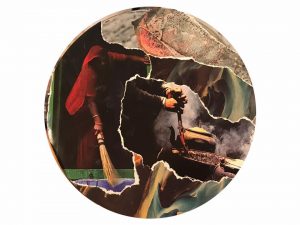A post reflecting on last Monday’s holiday, Labor Day by Jan Blencowe —
Laboring brings up many connotations. Labor is thought of as synonymous with work, and “work” can feel hard and unpleasant. Thus, we have a holiday, Labor Day, which sets us free from our labor for a day of rest. This is an idea that has kinship to the concept of Sabbath and the Years of Jubilee practiced by the Hebrews in Old Testament times.
 Hard labor is meted out as a punishment. The laboring class is often characterized as oppressed. The extreme or shadow side of labor is slave labor. In paintings, books and film peasants are sometimes shown idealized or romantically cast as laboring in the fields, and working in harmony with nature.
Hard labor is meted out as a punishment. The laboring class is often characterized as oppressed. The extreme or shadow side of labor is slave labor. In paintings, books and film peasants are sometimes shown idealized or romantically cast as laboring in the fields, and working in harmony with nature.
Your “labor” can be your profession or job, and the work you do may feel synonymous with your identity. Childbirth is called labor. Saints and clergy or those in religious life are often thought of as laboring on behalf of the souls of others.
Some things we do we call ” a labor of love” and some things are “laborious”.
As you relax, barbeque or head out to the beach on Labor Day I ask you to consider this: right now, at this moment in your life’s journey, what is your sacred labor? What is the work that you are called to do in the world? What is the nature of the work you are called to do in your inner world?
In Medieval times society was divided into three segments. Those who work were the peasants and serfs. Those who fight were the knights, and those who pray, were the clergy, monks, and nuns.
This interesting way of looking at society and the work we do provides us with an template for evaluating our own sacred work in the world.
Those “who work” could encompass those who create, grow, build, repair, invent, make, weave, sew, write, cook, heal, help, teach, and more. They are active “doers” who contribute to the welfare of others.
Those who fight are motivated by justice and compassion. They are activists, spokespersons, politically involved, journalists, guards and protectors. They are those who move and work on behalf of all of society, giving voice to the voiceless, defending the vulnerable, and protecting the planet.
Those who pray are deeply involved in their own inner worlds as a means of manifesting grace, forgiveness and spiritual growth and evolution in themselves,
and on behalf of the planet and humanity. They are active in the hidden and invisible worlds of spirit. They may be working in the spiritual realm on behalf of peace, justice, liberation, harmony, resurrection, renewal and restoration.
You may discover that you have more than one way of engaging your sacred labor. You may be one who prays, yet your times of introspection and contemplation might compel you to act as “one who fights” like a warrior, knight or advocate for a cause that calls to your heart.
Work and rest are two sides to the same coin. To do your sacred work effectively you must also allow for times of rest. In this regard I find nature to be the supreme teacher.
 In February, in the northern hemisphere, the earth begins to wake from her dark, ancient dream-sleep. The stirring in the belly begins in February when the sap begins to run in the maples. By the vernal equinox birthing new life has begun. At summer solstice fruit and flower are abundant. August brings Lammas, the little harvest. In September at the equinox the big harvest is ushered in with great celebration and gratitude. The earth has labored through the many months of growing solar energy, to produce plant and animal life on an awe inspiring scale. The end of October brings All Hallows, and rest in the disguise of death. The fallow time of late fall and winter provides the necessary rest, and renewal which is critical to the earth’s ability to labor and produce the following spring.
In February, in the northern hemisphere, the earth begins to wake from her dark, ancient dream-sleep. The stirring in the belly begins in February when the sap begins to run in the maples. By the vernal equinox birthing new life has begun. At summer solstice fruit and flower are abundant. August brings Lammas, the little harvest. In September at the equinox the big harvest is ushered in with great celebration and gratitude. The earth has labored through the many months of growing solar energy, to produce plant and animal life on an awe inspiring scale. The end of October brings All Hallows, and rest in the disguise of death. The fallow time of late fall and winter provides the necessary rest, and renewal which is critical to the earth’s ability to labor and produce the following spring.
Here is where I apply a healthy dose of earth wisdom. You simply can not continue to labor, create, birth and produce without an intentional fallow time of rest. No matter how sacred your work, how strong your calling or vocation you must honor your need for self-care and trust that Spirit will provide for the work to continue through others and other means while you rest.
This Labor Day take some time to rest and consider what your sacred work is and how you will work on your own behalf to create sacred rest so you may continue to follow your calling, serving others and the world in the years to come.

